This post may contain ads and affiliate links and we may earn a small commission when you click on the links at no additional cost to you. As an Amazon Affiliate, we earn from qualifying purchases. You can read our full disclaimer here.
Dealing with Golden Retriever Anxiety: Calming Tips and Strategies
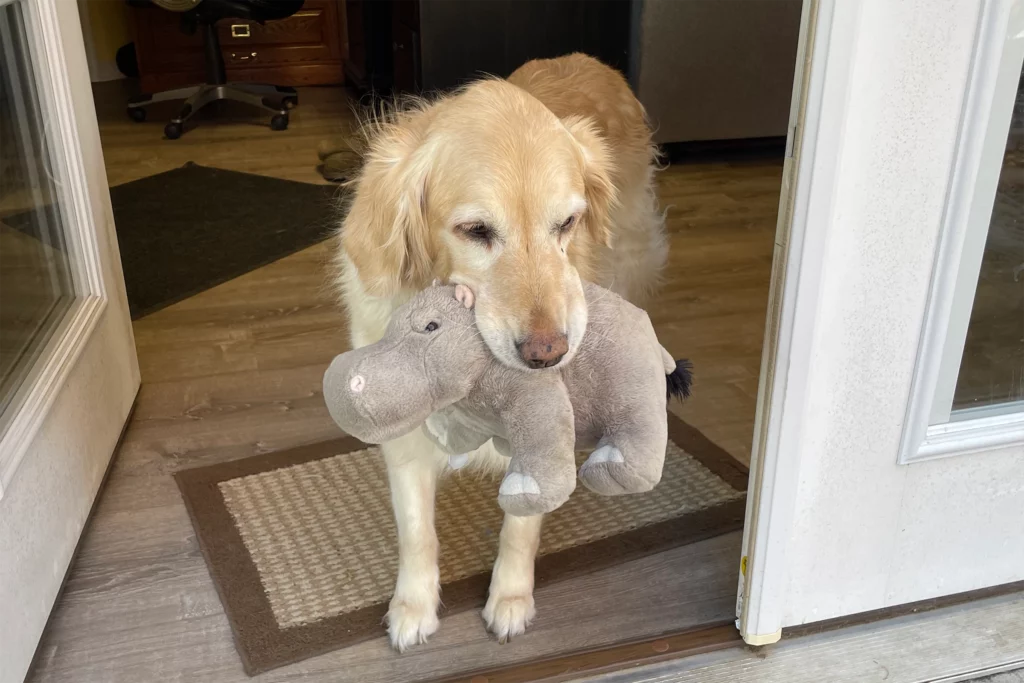
Dealing with Golden Retriever anxiety can be tough.
These friendly dogs often get scared or nervous. In this guide, we’ll talk about why Golden Retrievers get anxious and what you can do to help.
I’ve learned a lot from my own 11-year-old Golden Retriever, Daisy, who used to be scared of the vacuum cleaner and was anxious when we would leave her alone. We’ll share tips and ideas to make your Golden Retriever feel more relaxed and happy.
Identifying and Dealing with Golden Retriever Anxiety
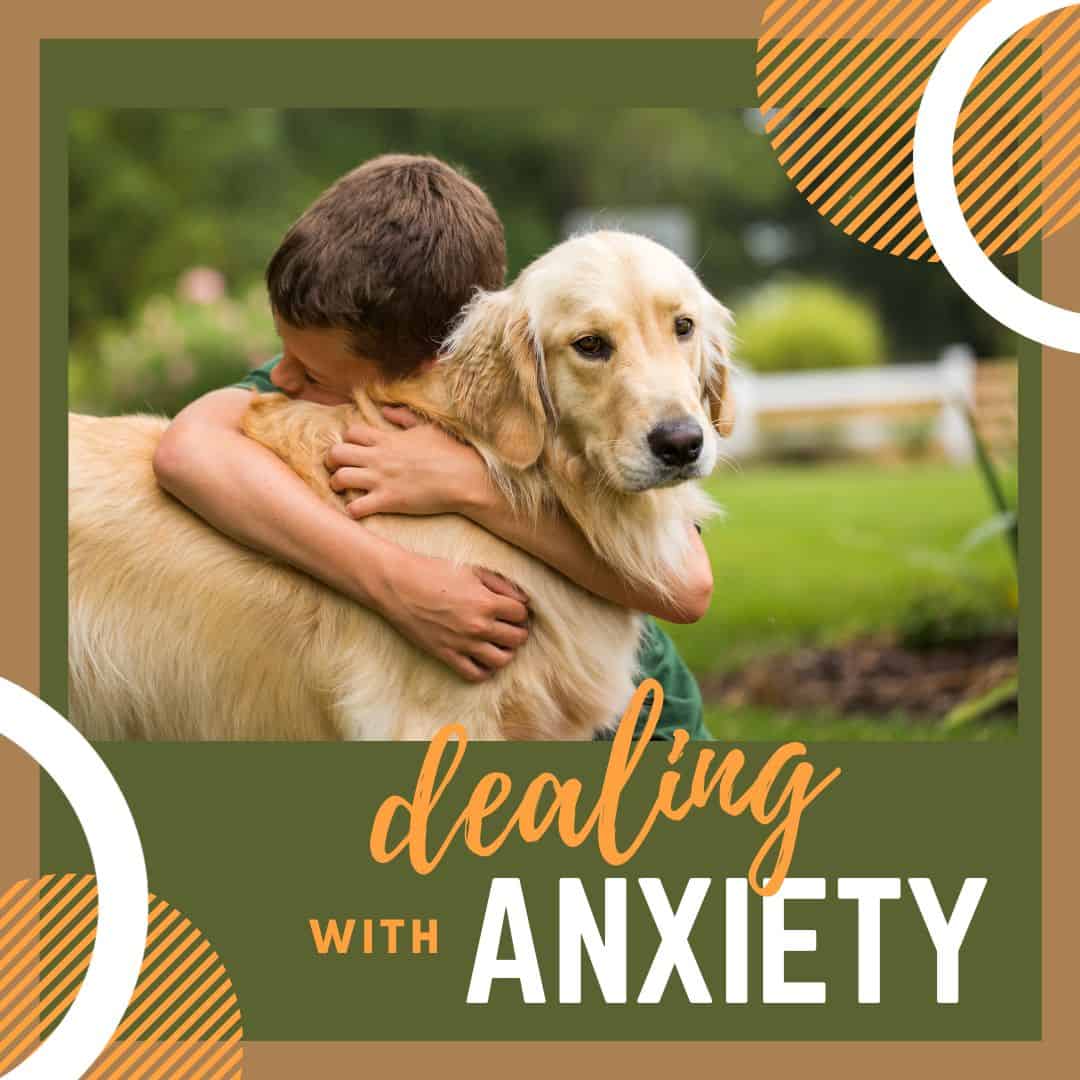
Anxiety in Golden Retrievers isn’t always easy to spot, as it can show up in different ways. Understanding these signs is crucial for early intervention and effective management.
Here are some behaviors that might indicate your Golden Retriever is experiencing anxiety:
- Excessive Barking or Whining: This behavior is often a response to stress or fear, particularly noticeable in situations like your departure from home or during loud events like thunderstorms.
- Pacing or Restlessness: An anxious Golden Retriever might frequently move around the house, unable to find a comfortable spot or settle down.
- Destructive Behavior: Chewing on furniture or other household items can be a sign of anxiety, especially when they’re left alone and feeling stressed.
- Shivering or Hiding: If your dog tends to hide or tremble during loud noises (like thunderstorms) or in the presence of unfamiliar objects (such as vacuum cleaners), it could be a sign of anxiety.
- Changes in Bodily Functions: Look out for increased drooling, panting, or changes in bathroom habits, as these can also be indicators of stress in your pet.
Understanding the Causes
Knowing what triggers your Golden Retriever’s anxiety is as important as recognizing the symptoms. Different dogs may react to various situations based on their personality, past experiences, and environment.
Let’s explore some common causes of anxiety in Golden Retrievers:
- Separation Anxiety: Golden Retrievers are known for their strong social bonds. They can become anxious and stressed when separated from their owners or left alone for extended periods.
- Loud Noises: Sensitivity to loud noises like thunderstorms, fireworks, and even household appliances like vacuum cleaners is common in many dogs, including Golden Retrievers.
- New Environments or Situations: Changes in their living environment, such as moving to a new home, or alterations in family dynamics, can be stressful. Encounters with unfamiliar animals or people can also trigger anxiety.
- Past Trauma: Particularly in rescue Golden Retrievers, previous negative experiences can have a lasting impact, leading to heightened anxiety in certain situations.
Recognizing these signs and understanding their underlying causes is the first step in helping your Golden Retriever manage anxiety.
Practical Strategies for Dealing with Golden Retriever Anxiety
Separation anxiety is a common form of stress in Golden Retrievers. These dogs form strong bonds with their owners and can struggle when left alone.
To help your Golden Retriever cope with separation anxiety, it’s important to create a sense of safety and routine. Here are some effective strategies:
- Create a Safe Space: Designate a comfortable area in your home where your dog can feel secure in your absence. This could be a cozy corner with their bed and favorite toys.
- Gradual Desensitization: Start by leaving your dog alone for short periods. Gradually increase the time as they become more comfortable being alone.
- Leave Comforting Items: Items like a piece of clothing with your scent or a favorite toy can provide comfort while you’re away.
- Consistent Routine: Establishing a regular schedule for feeding, walks, and bedtime helps your dog feel more secure and less anxious.
Managing Anxiety During Thunderstorms and Loud Noises
Loud noises such as thunderstorms and fireworks can be particularly distressing for Golden Retrievers. These sounds may trigger their anxiety and cause them to panic.
To help your dog deal with these fears, you can use the following techniques:
- Provide a Safe Haven: Identify a quiet room or a special spot in your home where your dog feels safe. This could be a closet, a bathroom, or under a table with comfortable bedding.
- Background Noise: Playing soft music or leaving the TV on can help mask the sound of thunder or fireworks.
- Stay Calm: Your dog looks to you for cues on how to react. By staying calm and composed, you can help your dog feel more relaxed.
- Comfort Them: Gentle petting or holding your dog can provide reassurance during these stressful events.
Helping Your Golden Retriever with Social Anxiety
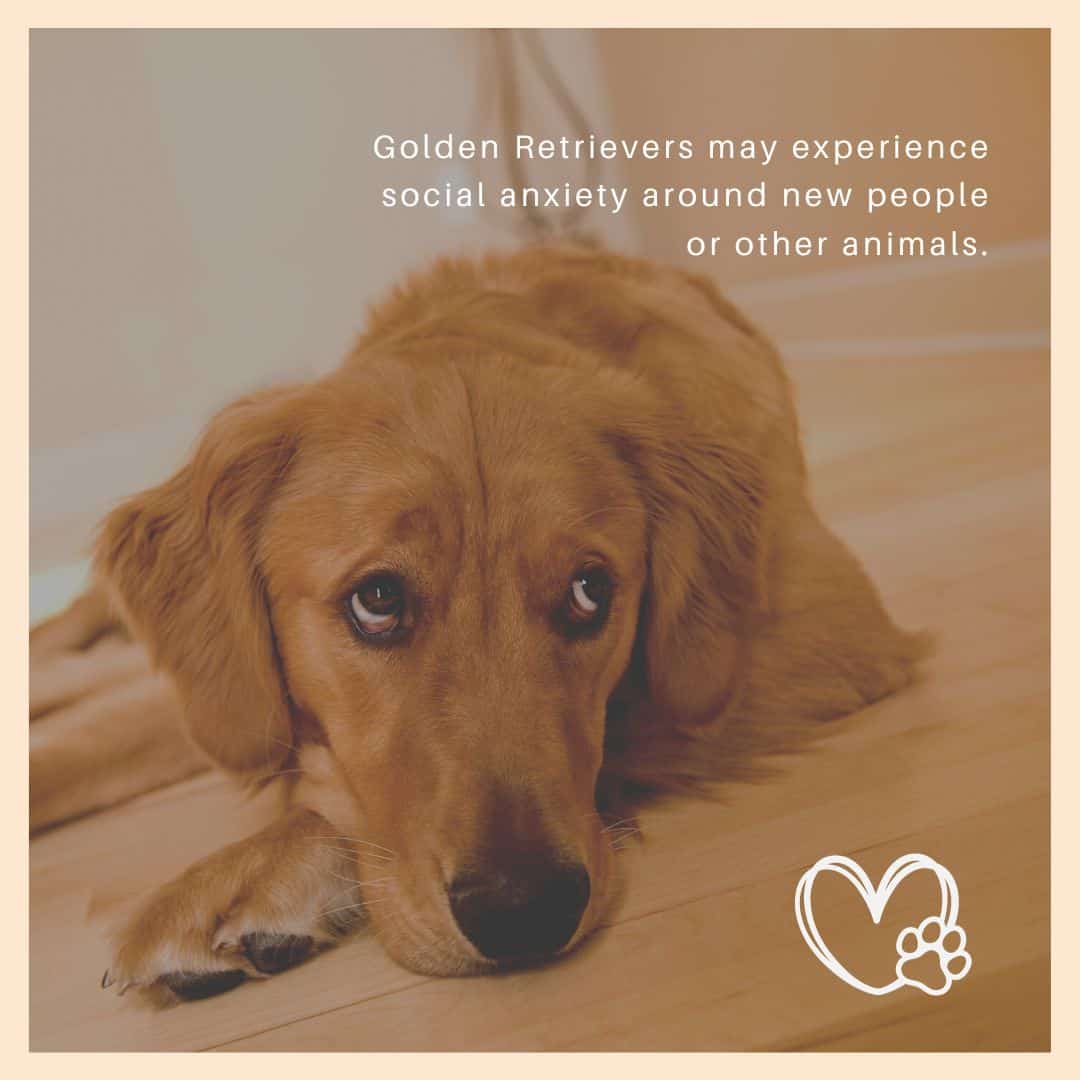
Social anxiety can occur in Golden Retrievers when they are around other animals or unfamiliar people.
This type of anxiety requires a gentle and patient approach to help your dog become more comfortable in social settings:
- Slow Introductions: Introduce your dog to new people and animals gradually, in a calm and controlled environment. This helps them adjust without feeling overwhelmed.
- Positive Reinforcement: Reward your dog with treats and praise when they display calm behavior around new individuals or animals.
- Obedience Training: Basic training can increase your dog’s confidence in social situations. Commands like ‘sit’ and ‘stay’ can also help manage their behavior around others.
- Avoid Force: It’s important not to force your dog into social interactions that seem to cause them stress. Recognize their comfort limits and respect their pace.
Reducing Anxiety Around Household Appliances
Many Golden Retrievers develop a fear of household appliances like vacuum cleaners. The noise and movement of these devices can be startling.
To help your dog overcome this fear, you can use the following methods:
- Introduce Slowly: Allow your dog to see and sniff the appliance while it’s turned off. This helps them get used to its presence without the associated noise.
- Associate with Positives: Try to associate the presence of the appliance with positive experiences, like treats or playtime.
- Gradual Exposure: Initially, use the appliance in a different room than where your dog is. Gradually bring it closer over time as they become more accustomed to the sound.
- Stay Calm and Positive: Your reaction to the appliance can influence your dog. By staying calm and positive, you can help your dog feel more at ease.
Each of these strategies requires patience and consistency. Remember, dealing with Golden Retriever anxiety is a gradual process, and every step you take helps your dog lead a more comfortable and happy life.
Read our post to find out if Golden Retrievers are outside dogs.
Practical Solutions and Training Tips for Dealing with Golden Retriever Anxiety
Training is a cornerstone in managing anxiety in Golden Retrievers. It’s more than teaching commands; it’s about building a bond of trust and understanding between you and your dog.
Effective training can significantly reduce anxiety by providing mental stimulation and a sense of security.
When your dog learns to respond to commands, it not only helps in managing their immediate reactions to anxiety triggers but also boosts their overall confidence.
Let’s explore some training techniques that can be particularly beneficial:
Positive Reinforcement
This is the foundation of effective training. Rewarding your dog for calm behavior or successfully following a command reinforces their desire to please and helps associate good behavior with positive outcomes.
Use treats, affection, or verbal praise as rewards.
Basic Command Training
Teaching your dog basic commands like ‘sit’, ‘stay’, ‘come’, and ‘leave it’ gives them a structure to follow and helps them focus during anxious moments.
These commands can be a lifeline in stressful situations, providing a familiar routine that can bring comfort.
Socialization Practices
Proper socialization is crucial for an anxious dog. Gradually introducing your dog to new people, animals, and environments in a controlled manner can reduce fear and anxiety associated with unfamiliar situations. This process should be slow and at a pace comfortable for your dog.
Desensitization Techniques
For dogs that are anxious about specific things like loud noises or certain objects, desensitization can be very effective.
This involves exposing your dog to these triggers in a controlled, gradual way, starting at a low intensity and slowly increasing it, helping them become accustomed and less reactive over time.
Clicker Training
This is a fun and interactive way to train your dog. The clicker sound acts as a marker for the desired behavior, immediately followed by a reward.
It’s a clear and consistent way to communicate with your dog, helping them understand exactly what behavior is being rewarded.
Lifestyle Changes for Dealing with Golden Retriever Anxiety
The daily routine and environment of your Golden Retriever play a significant role in managing their anxiety. A stable, predictable lifestyle can greatly alleviate stress and anxiety in dogs.
It’s about creating a safe, comfortable space and a routine that they can rely on.
Here are some lifestyle adjustments that can make a big difference:
Regular Exercise
Exercise is vital for a dog’s physical and mental well-being. Adequate daily exercise helps in burning off excess energy that could otherwise fuel anxious behavior.
Don’t miss our post that answers the question, when do Golden Retrievers calm down.
Activities like walking, running, or playing fetch are not only good for their health but also for their mental state.
Consistent Daily Routine
Dogs are creatures of habit, and a regular routine can provide a sense of security. Consistent times for meals, walks, and bedtime help your dog understand what to expect each day, reducing anxiety caused by unpredictability.
Creating a Dedicated Safe Space
Every dog should have a place where they feel completely safe and comfortable.
This could be a quiet corner of your house with their bed, some favorite toys, and perhaps an item of clothing with your scent. This safe space can be a refuge during times of stress.
Mental Stimulation
Keeping your dog’s mind active is as important as physical exercise. Puzzle toys, scent games, and regular training sessions can help keep their mind engaged, preventing boredom and reducing anxiety.
Quality Time and Affection
Spending quality, undistracted time with your dog is crucial. This time spent playing, cuddling, or simply being together can strengthen your bond and provide emotional support to your anxious dog.
Over-the-Counter Anxiety Relief Products for Dealing with Golden Retriever Anxiety
In addition to training and lifestyle changes, there are various over-the-counter products that can assist in managing anxiety in Golden Retrievers.
While these products can be helpful, it’s important to remember that they are not a substitute for veterinary advice, especially in severe cases.
Here’s a look at some non-prescription options:
Calming Chews and Treats
These are specially formulated treats that contain natural calming ingredients like chamomile, L-theanine, or CBD. They can be a helpful supplement to ease mild anxiety, especially when used in conjunction with training and lifestyle changes.
Anxiety Wraps and Vests
These garments apply gentle, steady pressure on your dog’s body, similar to a comforting hug. They can be particularly useful during events known to cause anxiety, such as thunderstorms or fireworks.
Pheromone Diffusers and Sprays
These products mimic the natural pheromones that mother dogs produce to calm their puppies. They can create a more soothing environment for your anxious dog.
Calming Music and Sound Therapy
Certain types of music and sound frequencies are designed to be calming for dogs. Playing this in the background can provide a sense of tranquility during stressful times.
Interactive and Distraction Toys
Toys that engage your dog’s attention can be a great way to distract them from anxiety triggers. These toys often involve problem-solving or physical activity, which can be a productive outlet for anxious energy.
Incorporating these solutions into your Golden Retriever’s life requires a thoughtful approach. It’s about finding the right balance and combination of techniques and products that work best for your individual dog.
Patience, consistency, and a deep understanding of your dog’s needs are essential in this journey towards managing their anxiety.
Remember, each dog is unique, and what works for one may not work for another. The goal is to create a supportive, loving environment where your Golden Retriever can thrive despite their anxiety.
Long-Term Strategies for Dealing with Golden Retriever Anxiety
Dealing with Golden Retriever anxiety effectively often requires a long-term approach. It’s about creating a consistent and supportive environment and knowing when to seek professional help.
These strategies are not quick fixes but rather ongoing efforts to ensure the well-being of your furry companion.
Building a Supportive Environment for Dealing with Golden Retriever Anxiety
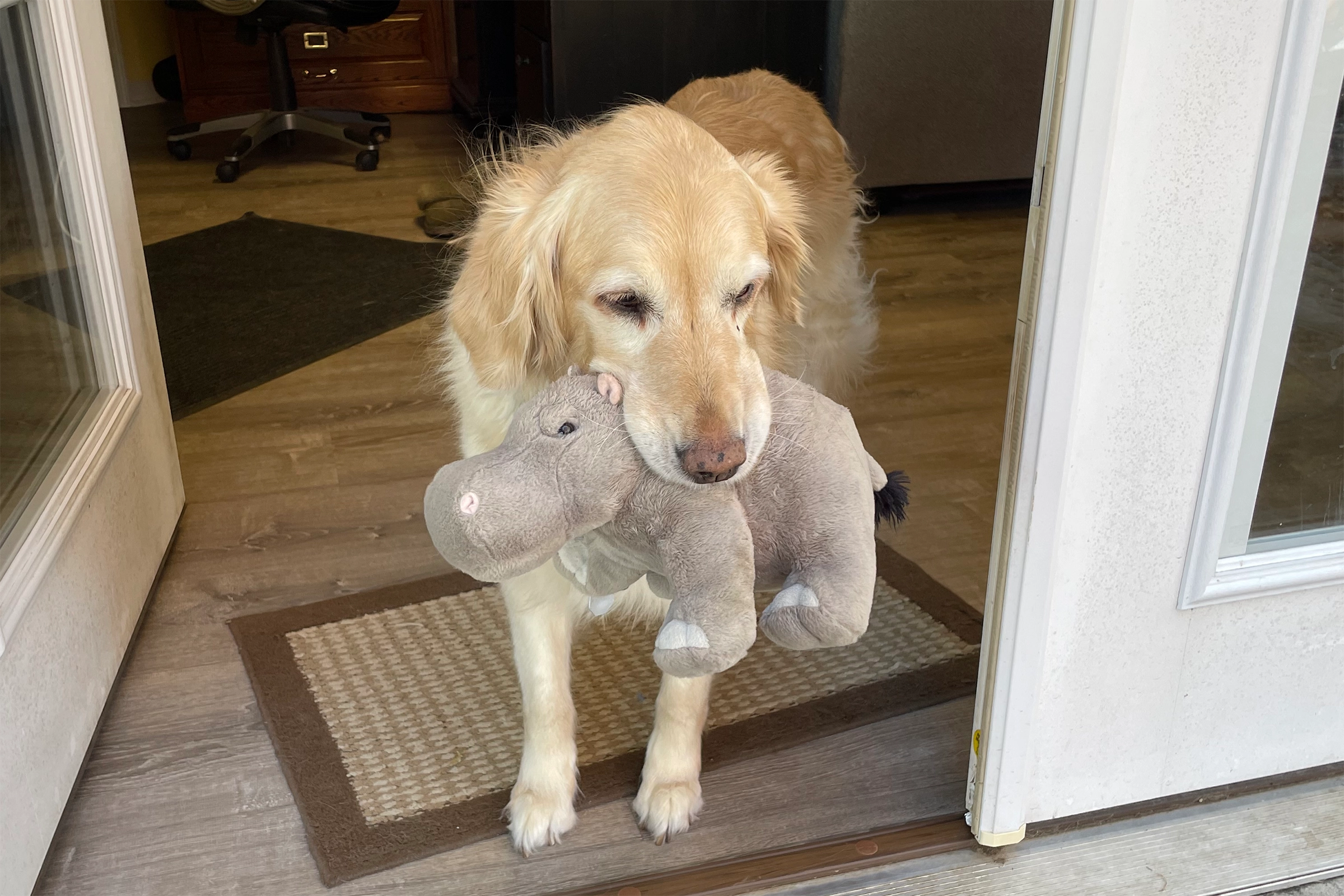
Consistency and Patience: The Key to Success
Consistency is the cornerstone of creating a supportive environment for a Golden Retriever dealing with anxiety. Dogs thrive on routine and predictability, which can significantly reduce stress and anxiety.
Establishing and maintaining a consistent daily schedule for meals, walks, and playtime is crucial. It helps your dog to know what to expect each day, providing a sense of security and stability.
Patience is equally important. Dealing with anxiety in dogs is often a gradual process, with progress and setbacks along the way. It’s essential to be patient and understanding, recognizing that every small step forward is a victory.
Celebrate these moments, and don’t get discouraged by the challenges. Remember, your dog can sense your emotions, so staying calm and positive can have a significant impact on their anxiety levels.
Creating a supportive environment also involves ensuring your home is a safe and comfortable space for your dog. This includes having a designated ‘safe spot’ where they can retreat when feeling overwhelmed and minimizing exposure to known stressors whenever possible.
Positive Reinforcement and Ongoing Training
Continued training and positive reinforcement play a vital role in managing long-term anxiety. Reinforcing commands and behaviors that help mitigate anxiety should be an ongoing process. Regular training sessions not only reinforce desired behaviors but also strengthen the bond between you and your dog, building trust and confidence.
When to Seek Professional Help for Dealing with Golden Retriever Anxiety
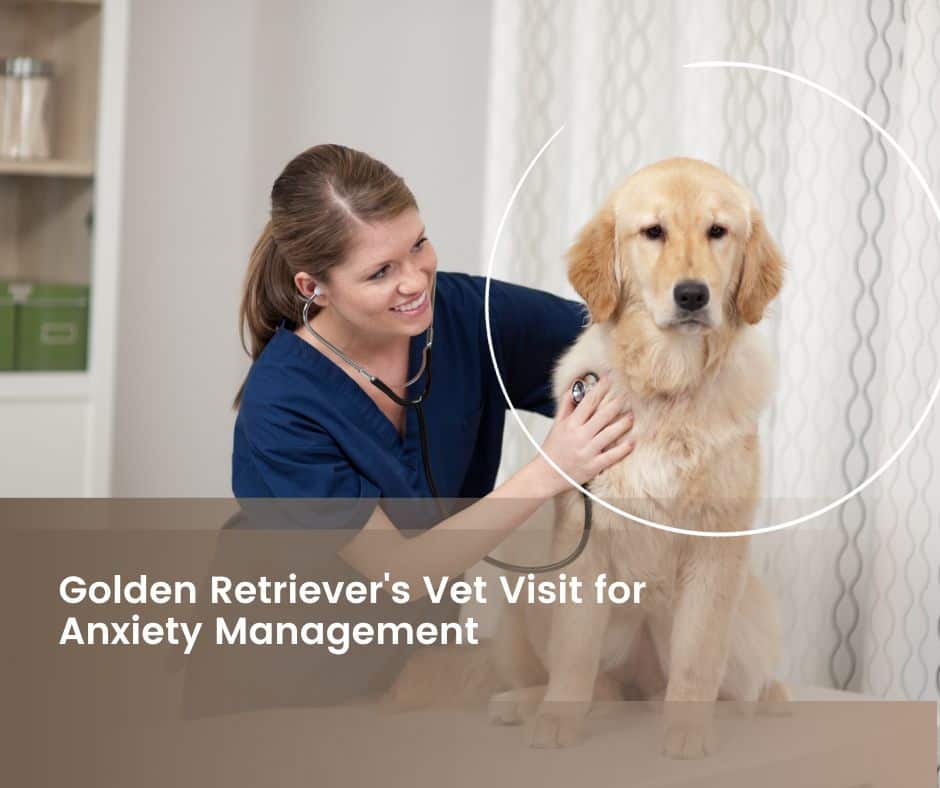
Recognizing the Signs of Severe Anxiety
While many anxiety issues can be managed at home, there are times when professional help may be necessary. Recognizing the signs of severe anxiety is crucial. These can include extreme changes in behavior, aggression, self-harm, or a complete shutdown in response to stressors.
If your dog’s anxiety significantly impacts their quality of life or poses a safety risk to themselves or others, it’s time to seek professional advice.
The Role of Professional Trainers and Behaviorists
Professional trainers and behaviorists specialize in understanding and modifying animal behavior. They can provide valuable insights and customized strategies to manage your Golden Retriever’s anxiety more effectively.
A professional can assess the situation from an objective standpoint, identify specific triggers, and develop a tailored plan to address the anxiety.
In some cases, a veterinarian may also recommend medication as part of the treatment plan, especially for severe cases of anxiety. It’s important to understand that medication is often used in conjunction with behavioral modification techniques, not as a standalone solution.
Managing Golden Retriever anxiety is a long-term commitment that involves creating a stable, supportive environment and knowing when to seek professional help.
With consistency, patience, and the right strategies, you can help your Golden Retriever lead a happier, more relaxed life.
Remember, every dog is unique, and what works for one may not work for another. Stay attuned to your dog’s needs and be willing to adapt your approach as necessary.
Myths vs. Facts About Dealing with Golden Retriever Anxiety
When it comes to dealing with Golden Retriever anxiety, there are numerous misconceptions that can lead to confusion and ineffective approaches.
It’s important to separate myths from facts to ensure that your Golden Retriever receives the best possible care and understanding.
Let’s debunk some common myths and establish the facts.
Myth 1: Golden Retrievers Are Always Happy and Don’t Get Anxious
Fact:
Despite their reputation as cheerful and friendly dogs, Golden Retrievers, like any other breed, can experience anxiety. Their anxiety can stem from various factors such as separation, loud noises, or changes in their environment.
It’s crucial to recognize that even the most seemingly carefree dog can suffer from anxiety.
Myth 2: Anxiety in Dogs Is Just Bad Behavior
Fact:
Anxiety is not simply a matter of bad behavior. It’s a genuine emotional response that can manifest in various ways, including destructive behavior, excessive barking, or restlessness.
Understanding that these behaviors are symptoms of anxiety, rather than intentional misbehavior, is key to effectively addressing the issue.
Myth 3: Ignoring the Anxiety Will Make It Go Away
Fact:
Ignoring a Golden Retriever’s anxiety won’t make it disappear. In fact, without proper management and care, anxiety can worsen over time.
It’s important to acknowledge and address the anxiety with appropriate strategies, such as training, lifestyle changes, and, if necessary, professional help.
Myth 4: Medication Is the Only Solution for Anxiety
Fact:
While medication can be an effective part of a treatment plan for severe anxiety, it’s not the only solution. A holistic approach that includes training, environmental changes, and possibly over-the-counter calming aids can also be highly effective.
Medication is often used in conjunction with other treatments, not as a standalone solution.
Myth 5: Anxiety Is Only Caused by Traumatic Events
Fact:
While traumatic events can certainly contribute to anxiety, they are not the only cause. Anxiety in Golden Retrievers can also be triggered by genetics, lack of socialization, changes in routine, or even aging. It’s important to consider all potential factors when addressing your dog’s anxiety.
Understanding these myths and facts is crucial in dealing with Golden Retriever anxiety effectively. Recognizing the signs of anxiety and responding with empathy and informed strategies can make a significant difference in your dog’s quality of life.
Remember, every dog is unique, and what works for one may not work for another. Being patient, observant, and responsive to your dog’s needs is key to successfully managing their anxiety.
Final Thoughts on Dealing with Golden Retriever Anxiety
In conclusion, managing anxiety in Golden Retrievers requires a blend of understanding, patience, and informed action.
Recognizing the signs of anxiety, debunking common myths, and employing a combination of training techniques, lifestyle adjustments, and, when necessary, professional help, are all crucial steps in this journey.
Remember, each Golden Retriever is unique, and what works for one may not work for another. The key is to remain patient, observant, and adaptable, always prioritizing the well-being and happiness of your furry companion.
With the right approach and a lot of love, you can help your Golden Retriever navigate through their anxiety and enjoy a more relaxed, joyful life.
-

Coffee Mug – In Dog Coffees I’ve Only Had One
$11.95 – $14.95 Select options This product has multiple variants. The options may be chosen on the product page
